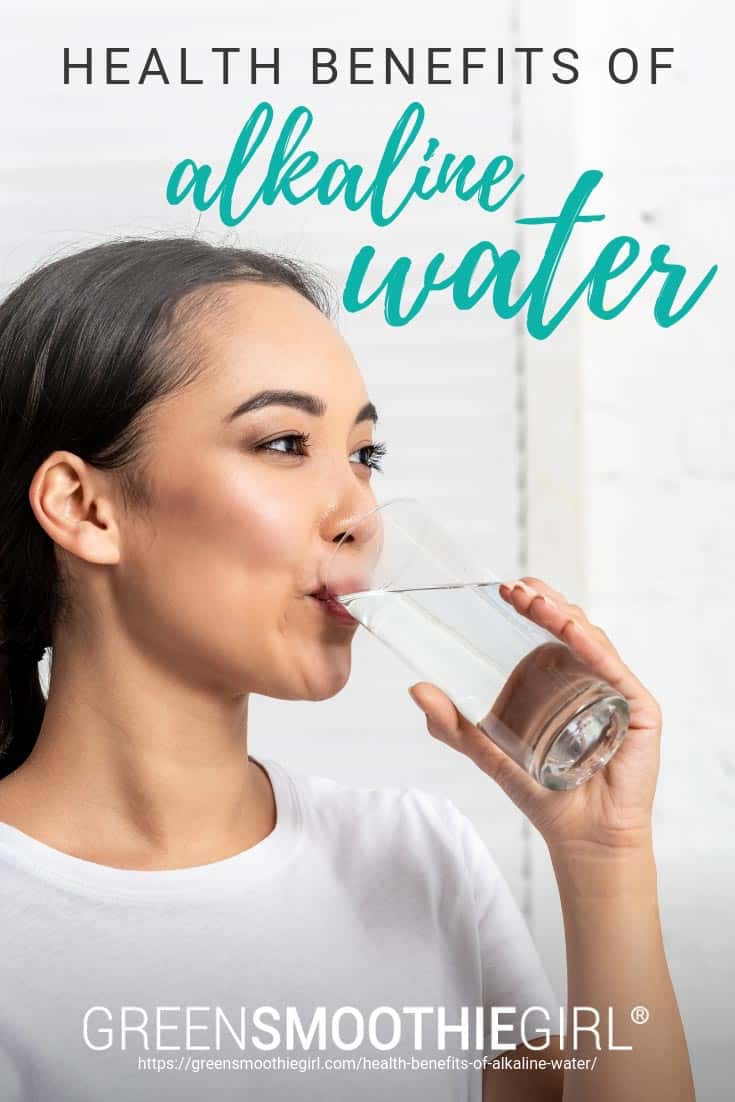Health Benefits of Alkaline Water

If you’re up on the latest health trends, you may have heard about the importance of alkalinity in the body for slowing aging, preventing disease, and even losing weight.
Alkaline water is part of that lifestyle, and it’s become more popular and widely available on supermarket shelves, making it more accessible than ever.
But does it live up to the hype? I have firsthand experience that it offers noticeable change, but we’ll get there in a bit. Let’s talk about what “alkaline” actually means and how it benefits your body.
In this article:
- The Delicate Balance of pH
- What Is Alkaline Water, and Where Can You Get It?
- Alkaline Water Is Ionized Water
- Health Benefits of Alkaline Water
- Alkaline Water vs. Distilled Water vs. Reverse Osmosis
The Delicate Balance of pH
What does “alkaline” actually mean? Let’s take a brief trip back to Chemistry 101, where we learned about the pH scale.
This scale measures the acidity or alkalinity of a substance (remember acids and bases?). It ranges from 0 to 14, with 0 being very acidic (think battery acid) and 14 being very alkaline (think liquid drain cleaner). In the middle lies pure drinking water with a perfectly balanced pH level of 7.
All living things require certain pH levels, in both their internal and external environments, in order to survive.
Let’s take a look at the human body and the planet at large. Before the industrial revolution, the pH of the oceans had remained at 8.2 for millions of years. In less than 100 years, predominantly due to carbon dioxide (CO2), we have decreased the pH of the seas to 8.11.
It might not look that significant, but this drop has disrupted the delicate balance that must be maintained for life to thrive in the oceans. In this case, one tenth of a point on the pH scale is actually very significant!
In fact, this change is making it harder for coral to build skeletons and for shellfish to build protective shells. By 2050, live coral reefs, home to millions of sea creatures, are projected to become an endangered species2.
Human Body pH Balance
What does all of that have to do with your body? To begin, 60% of your body and over 70% of your brain and blood are made up of water, and, just like the oceans, your body must maintain a certain pH level to survive.
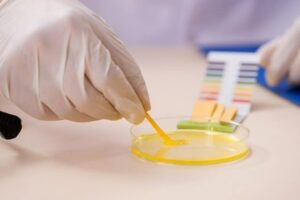
If your body's pH is even slightly off, you are at risk for major health problems.
For humans, the natural pH of blood is right around 7.4. If this level changes for some reason, even by as little as .05 in either direction, you may be in danger of entering a coma. If it rises to 7.8 or lowers to 6.8, you risk death3.
Because of this very small pH range, your body goes to incredible lengths to maintain its acid-alkaline balance.
The lungs get rid of CO2 every time you exhale, while the kidneys eliminate both sulfuric and uric acids. They do this work by using alkali reserves derived from an alkaline diet.
When these dietary reserves are unavailable, the body draws the needed amount in the form of calcium and other alkaline minerals from your bone, teeth, and tissues, ultimately weakening your entire body. If the processes that maintain an alkaline environment can’t keep up with the body’s production of acids, it may result in a condition known as acidosis.
With this overabundance of acidity, your cells no longer function properly, and a wide variety of health problems emerge.
Health Risks of an Acidic pH Balance
Diseases associated with an acidic environment in the body include:
- Cancer
- Diabetes
- Kidney damage
- Heart disease
- Stroke
- Liver problems
- Arthritis
- Obesity
- Osteoporosis
- Acid reflux
- Premature aging
The bottom line: To maintain health and energy, we need a body that is alkaline.
Alkaline Bodies Live Longer
There are two commonly studied cultures in which folks regularly live to over 100 years old, sometimes upwards of 120: the Hunzas and the Okinawans.
One lives in the shadows of the Himalayas, and the other resides on a subtropical island about 400 miles south of Japan. Eating a plant-based diet is one thing both cultures have in common.
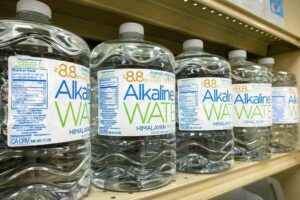
The groups of people who live the longest drink alkaline water.
The second commonality is the water they drink. While they may describe it as “living water,” in the US, we refer to it as alkaline water.
Unfortunately, much of today’s Standard American Diet is made up of processed food, meats (animal proteins), sugar, white flour, dairy products, coffee, and soda—all of which are acidic. We have very, very different diets than these two cultures. Even pharmaceuticals, the electromagnetic frequencies in your environment, and stress can lead to an acidic inner terrain.
What Is Alkaline Water and Where Can You Get It?
Alkaline water typically has a pH level of about 8 or 9. It also contains several key minerals such as calcium, potassium, sodium, and magnesium, all of which help maintain acid-alkaline balance.
You can find alkaline water right in nature. As water travels through soil and rocks, it picks up minerals along the way and becomes more alkaline. Spring water obtained from natural sources are alkaline for this reason. (Sometimes, however, spring water can be contaminated, so many “natural spring” bottled water brands aren’t necessarily better. Always learn more about the source.)
While not everybody lives near a pure spring water source, don’t rely on purchasing the alkaline bottled water you see at stores. As with any bottled water, plastic is bad for the environment and for your body.
In 2017, Americans purchased about 13.7 billion gallons of bottled water4. Not only are we adding a majority of these to landfills and depleting our natural springs, but we’re also depleting our pocketbooks.
Essentia, a bottled alkaline water advertising a 9.5 pH level, costs about $7.33 per gallon. Compare this to alkaline water derived from a water ionizer in your home, installed on your sink, which comes in at a mere 17 cents per gallon, and you can see that purchasing alkaline spring water gets expensive—quickly!
Alkaline Water Is Ionized Water
Another common name for alkaline water is “ionized water.” This refers to the process of creating alkaline water, separating the alkaline components from its acidic components via electrolysis.
The best and most efficient way to make alkaline water is with the use of a water ionizer. Plus, ionized water does not keep well in plastic bottles and, ultimately, can lose its charge.
I’ve had my own water ionizer installed under my sink that dispenses from a faucet drilled into my counter for years now—and I love it! A friend told me about it 10 years ago and she said the health gains were so impressive that they rivaled her shift to a vegan, mostly raw diet years before when she was diagnosed with cancer.
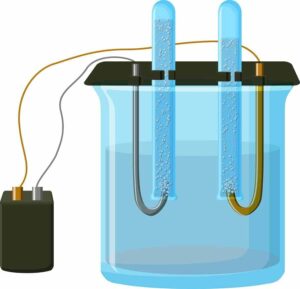
Electrolysis allows normal water to transform to ionized/alkaline water.
One of the health benefits of alkaline water my children and I noticed right away was a significant increase in energy. More hydration helps with your energy, of course, but so do the minerals that alkaline water contains like potassium.
Not only can you set the pH to a perfect 9.5 with a home ionizer, but the ionization process also creates antioxidants5—those compounds that we derive mostly from the fruits and vegetables we eat and that remove waste products from our cells before they can do harm.
Did you know you can do more to increase your pH by drinking alkaline water than with any other habit—even adopting a raw vegan diet?
Health Benefits of Alkaline Water
What does alkaline water actually do for your body? The health benefits are numerous:
- Creates an inhospitable environment for disease states, including cancer.
Did you know most pathogens and cancer cells cannot survive in an alkaline environment? Keiichi Morishita, author of The Hidden Truth of Cancer, explains:
“Acid decreases energy production in the cells, the ability to repair damaged cells, the ability to detoxify heavy metals, and makes the body more susceptible to fatigue and illness. Your body pH affects everything. Research has proven that disease cannot survive in an alkaline state, and that viruses, bacteria, yeast, mold, fungus, candida, and cancer cells thrive in an acidic, low oxygen, low pH environment.”6
- Manages blood sugar.
Your pancreas is the organ responsible for making insulin. This is the hormone that allows your cells to use glucose, or sugar, for the energy they need to perform their many functions. When the pancreas stops making enough insulin, sugar builds up in the bloodstream, resulting in diabetes.
The pancreas requires an alkaline environment in order to produce digestive enzymes and release insulin. Dr. Keijiro Kuwabara of Japan has been successfully treating diabetes with alkaline water for many years7.

Alkaline water has the potential to create a healthy environment for your pancreas so it can produce plenty of insulin.
- Detoxifies and promotes weight loss.
The accumulation of acid waste around the cells creates a toxic condition. In an attempt to remedy this environment, the body creates fat cells with a mission to contain the acid waste and keep it away from the body’s vital organs.
Creating an alkaline environment reduces these toxins, which essentially takes away the fat cells’ reason for existence. The result is reduced fat and movement toward a natural and healthy weight.
This isn’t something we have to try real hard for either. It’s a natural result of a plant-based, whole-foods, alkaline diet.
The detoxification benefits are numerous and extend beyond weight loss. A study conducted in 2011 found that participants who drank alkaline water for two months excreted 10 toxic heavy metals8.
- Lowers stroke and heart disease risk.
One important advantage among the health benefits of alkaline water is that it lowers risks of stroke and heart disease. As we mentioned, the pH of the body is intimately tied to your blood’s quality. As acidity and dietary waste increase, so, too, does cholesterol-forming plaque and acid crystals that build up on the wall of the blood vessels.
Narrowing of the arteries and veins ultimately reduces blood flow, leading to both heart disease and stroke.
Alkaline water with a high mineral content has been shown to lower the incidence of coronary heart disease, cardiovascular disease, and cancer9.
By the same token, reducing acid crystals also alleviates gout, a painful condition associated with the accumulation of uric acid in the joints.
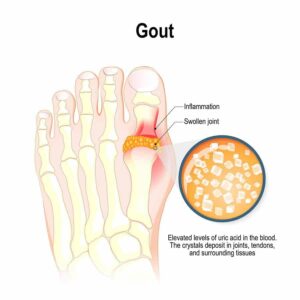
Alkaline water might help relieve issues associated with gout or other similar diseases.
In a study published in the Journal of the International Society of Sports Nutrition, the results showed that alkaline water reduced the viscosity of participants' blood10. This means the blood flowed more efficiently, which is very important for circulation of oxygen and nutrients around the body.
- Lowers cholesterol (and increases weight loss).
You may have heard of metabolic syndrome. It is characterized by obesity, high blood sugar, high blood pressure, and low amounts of HDL (the “good guy” in cholesterol). It is also a predictor for cardiovascular disease and type 2 diabetes.
Researchers at the University of Pittsburgh Medical Center had subjects drink alkaline water for eight weeks. All participants demonstrated improvement in the levels of oxidative stress markers including a decrease in “bad” cholesterol (LDL) and an increase in antioxidant activity5.
Their conclusion? Hydrogen-rich ionized water represents a potential therapeutic and preventive strategy for the treatment of metabolic syndrome.
- Reduces osteoporosis risk.
As the body fights to maintain its alkaline levels in an acidic environment, it pulls calcium (an alkalizing mineral) from bones and teeth. This weakens your body’s structural integrity. For the same reason, those with an acidic internal environment can also experience cavities, as the protective minerals are extracted to level the body’s pH.
To further emphasize this point, a study reported in the medical journal Bone revealed that participants who drank alkaline water had significant reductions in two biomarkers used to measure bone loss11. They were able to reabsorb calcium back into their bones, making them stronger.
- Reduces acid reflux symptoms.
Notice that I said “symptoms.” While the billion-dollar antacid industry would like you to believe that too much acid in the stomach is the cause of your “heartburn,” the truth is your stomach contains one of the most powerful acids known—hydrochloric acid.

Alkaline water has the potential to relieve acid reflux symptoms.
When this acid is deficient, the stomach must use what acids it contains. In an attempt to digest protein with little acid, the stomach churns violently, causing pressure and backflow into the esophagus. This eventually weakens the delicate sphincter that separates the stomach (and the acids it contains) from the esophagus.
You’ll know the feeling when your chest is burning from the acid that rose up (it’s also known as heartburn).
Alkaline water helps soothe acid reflux because the higher pH level kills pepsin, the enzyme involved in breaking down proteins in the stomach and one of the main contributors to acid reflux.
In much the same way that antacids work, alkaline water offers relief from some very uncomfortable symptoms—in a more natural way.
A study conducted at the Voice Institute of New York concluded that drinking alkaline water (8.8 pH) instantly inactivated pepsin and had good acid-buffering capabilities12.
The bottom line? Considering the many health benefits of alkaline water, it is a much better choice when reducing the symptoms of heartburn than taking antacids.
(Ultimately, however, you want to get down to the cause of esophageal reflux, which is most likely a diet high in processed foods, alcohol, soda, fried foods, or vegetable oils.)
Alkaline Water vs. Distilled Water vs. Reverse Osmosis
Bottled water is part of a multi-billion-dollar industry. In 2017, it generated about $2.52 billion in sales in the U.S. alone13.
The sad fact is that humans are now consuming one million plastic bottles of water per minute. Yes—per minute— and 91% of these are not recycled. Almost all the plastic produced by this current craze is added to landfills or ends up in the oceans. By 2050, it is estimated that the ocean will contain more plastic, by weight, than fish14.
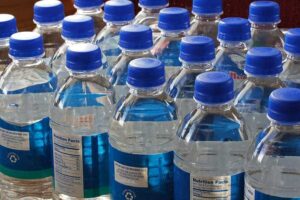
Bottled water is super popular, however, it might not be the best way to consume your water.
When you consider the results of a four-year study conducted by the Natural Resources Defense Council that found 40% of bottled water was just regular tap water put in a bottle, you realize the importance of buying your own water filtration system that creates better water from your tap15.
A few of the different types of home water filters include the following:
- Activated Carbon Filters
These filter out larger particles and reduce the amount of chlorine in the water. Carbon filters eliminate pollutants through absorption, and while they are good at removing chlorine and other chemicals, they are not so good at filtering heavy metals.
- Reverse Osmosis
This popular filter is said to trap over 90% of all dissolved salts, bacteria, and heavy metals. On the other hand, it is not as efficient at filtering out chlorine.
- Distilled Water
Distilled water filters are capable of removing just about everything from your water. Unfortunately, this includes the minerals important to good health, such as calcium and magnesium. Distilled, reverse osmosis, and activated carbon filters all tend to produce water in a more acidic range.
- Alkaline/Water Ionizers
As I mentioned earlier, water ionizers use a process known as electrolysis. The alkaline water machine makes electrically charged plates separate the water into two streams—one of which is alkaline. It removes toxins and chemicals while concentrating health-giving alkaline minerals.
Now that you have a clear understanding of the health benefits of alkaline water, you know that consuming this incredible water should be on your daily to-do list.
If you want to learn more about water filtration and water ionizers for your home, including the one I use every day, see my filtered water recommendations.

Disclosure: This post may contain affiliate links that help support the GSG mission without costing you extra. I recommend only companies and products that I use myself.
Sources
- Brewer, Peter G. “Rising Acidity in the Ocean: The Other CO2 Problem.” Scientific American. September 1, 2008.
- Parker, Laura; Welch, Craig. “Coral Reefs Could Be Gone in 30 Years.” National Geographic. June 23, 2017.
- Jacob, Kirsten. “How Our Bodies Go To Extraordinary Lengths To Maintain Safe pH Levels.” Forbes. March 11, 2016.
- Arthur, Rachel. “‘Bottled water is America’s favorite drink!’ Bottled water takes top spot in US.” BeverageDaily. June 1, 2018.
- Nakao, Atsunori et al. “Effectiveness of Hydrogen Rich Water on Antioxidant Status of Subjects with Potential Metabolic Syndrome—An Open Label Pilot Study.” Journal of Clinical Biochemistry and Nutrition. 2010 Mar; 46(2): 140–149. Published online 2010 Feb 24. doi: 10.3164/jcbn.09-100
- Keiichi Morishita, The Hidden Truth of Cancer. George Ohsawa Macrobiotic Foundation. 1976.
- Whang, Sang. Reverse Aging. JSP Publishing. 1990.
- Abraham, Guy E. et al. “The effect of daily consumption of 2 liters of electrolyzed water for 2 months on body composition and several physiological parameters in four obese subjects: a preliminary report.” Original Internist. September 1, 2011.
- Abdul-Lateef Mousa, Haider. “Health Effects of Alkaline Diet and Water, Reduction of Digestive-tract Bacterial Load, and Earthing.” Alternative Therapies in Health and Medicine. 22(S1):24-33. April 2016.
- Weidman, Joseph et al. “Effect of electrolyzed high-pH alkaline water on blood viscosity in healthy adults.” Journal of the International Society of Sports Nutrition. 2016. https://doi.org/10.1186/s12970-016-0153-8
- Wynn, E. et al. “Alkaline mineral water lowers bone resorption even in calcium sufficiency: alkaline mineral water and bone metabolism.” Bone. 2009 Jan;44(1):120-4. doi: 10.1016/j.bone.2008.09.007. Epub 2008 Sep 26.
- Koufman, JA.; Johnston, N. “Potential benefits of pH 8.8 alkaline drinking water as an adjunct in the treatment of reflux disease.” The Annals of Otology, Rhinology, and Laryngology. 2012 Jul;121(7):431-4.
- “Sales of the leading bottled still water brands in the United States in 2018 (in million U.S. dollars).” Statista. 2018.
- Nace, Trevor. “We're Now At A Million Plastic Bottles Per Minute - 91% Of Which Are Not Recycled.” Forbes. July 26, 2017.
- Olson, Erik D. et al. “Bottled Water: Pure Drink or Pure Hype?” Natural Resources Defense Council. February 1999.
Posted in: Healthy Weight, Immunity, Lifestyle, Natural Remedies, Preventive Care


